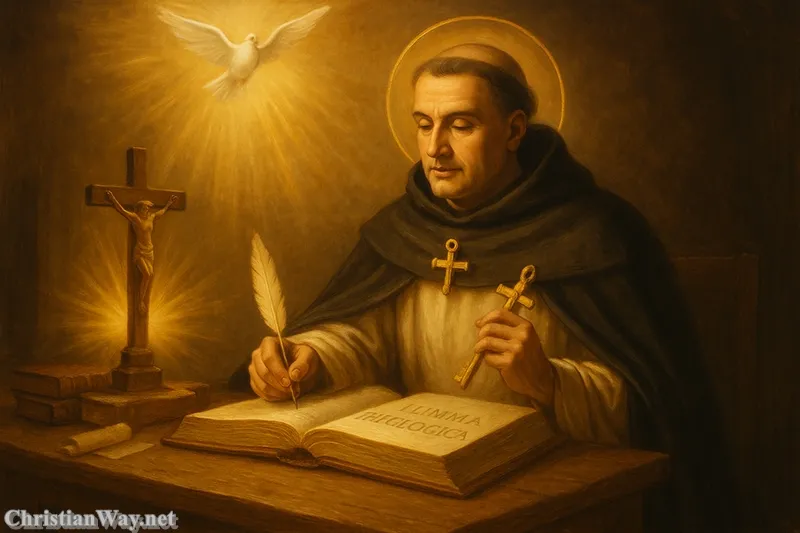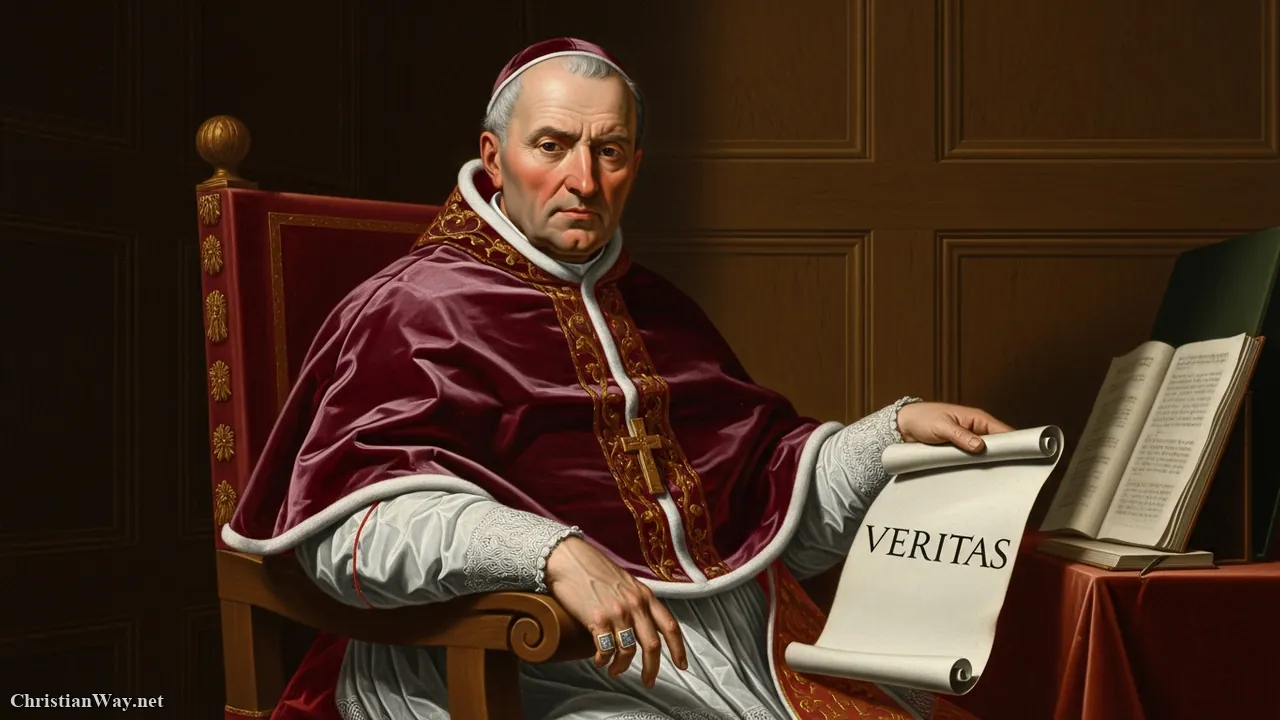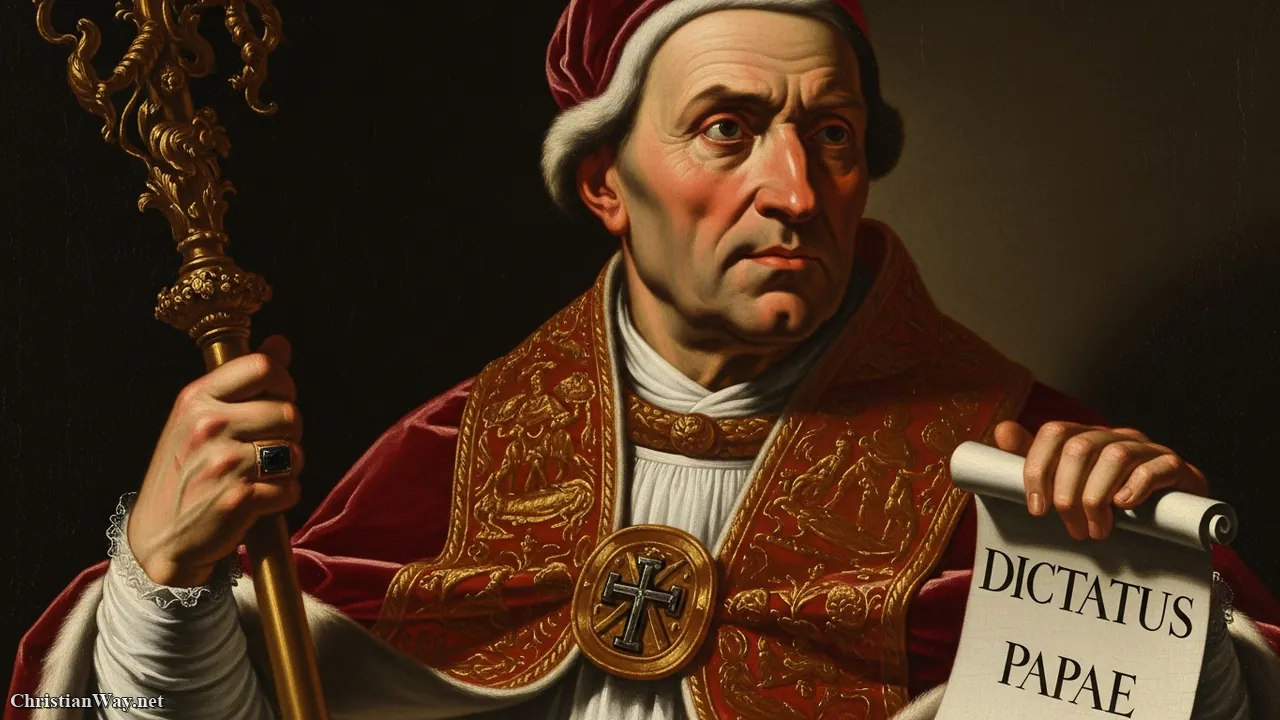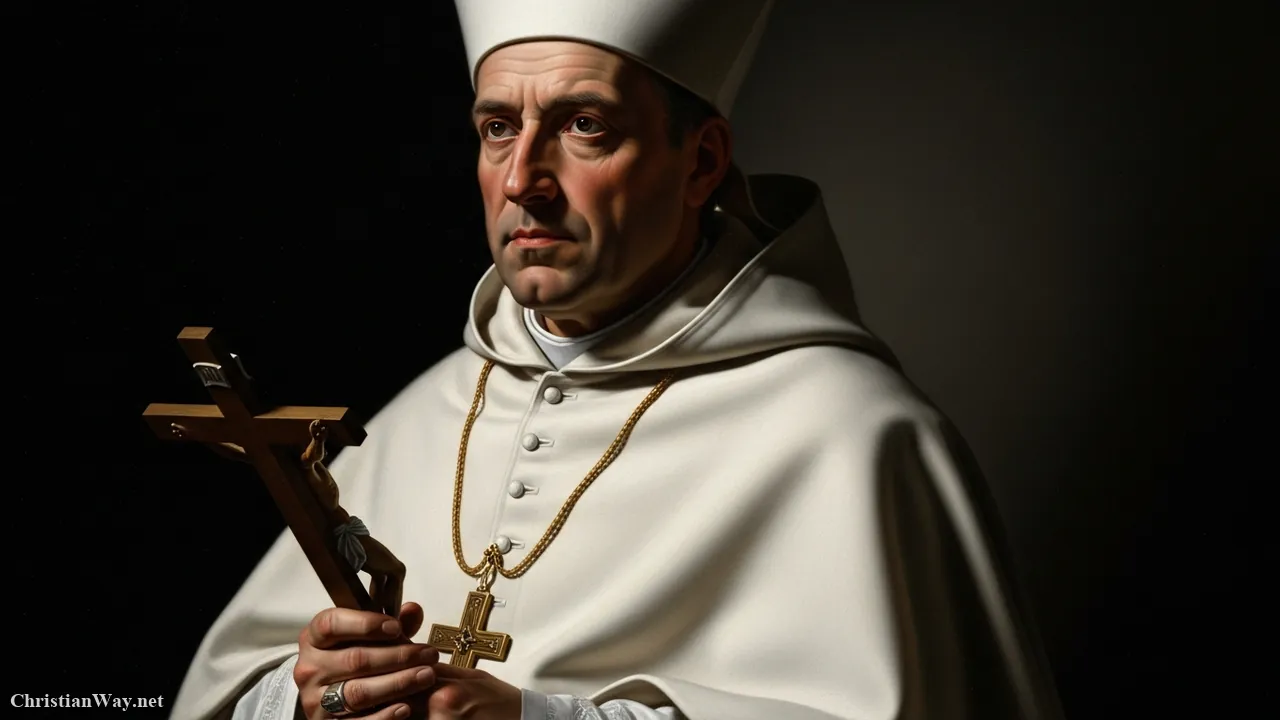Dear friends in Christ,
In every age, God raises up men and women who unite holiness with wisdom — souls whose faith illuminates the mind and whose intellect deepens faith. Among them, few shine so brightly as Saint Thomas Aquinas, the great Doctor of the Church, theologian, philosopher, and mystic.
To speak of Saint Thomas Aquinas is to speak of the harmony of truth — of how reason and revelation, faith and philosophy, grace and nature, all find their unity in God. His life was not merely that of a scholar, but of a saint who saw all knowledge as a way to love the Creator more deeply.

He is known as the Angelic Doctor, not only for the purity of his thought but for the purity of his soul — a man whose wisdom came from contemplation, whose study was prayer, and whose theology was born from love.
Let us journey through the life and spirit of this remarkable servant of God — to see how his intellect, humility, and sanctity continue to enlighten the Church and the world.
The Early Life of Saint Thomas Aquinas — The Silent Student of God
From nobility to humility
St Thomas Aquinas biography begins in the year 1225, in Roccasecca, Italy, near Aquino. He was born into a noble family destined for influence and comfort. Yet, from his earliest years, Thomas’s heart longed for something higher than earthly honor — the truth of God.
At the age of five, he was sent to the Benedictine Abbey of Monte Cassino, where he received his early education and spiritual formation. The monks soon recognized his quiet intelligence and gentle spirit. But when his parents hoped he would become abbot and bring prestige to their family, God had another plan.
During his studies in Naples, Thomas encountered the newly founded Dominican Order, known for preaching, poverty, and scholarship. Drawn to their simplicity and zeal, he decided to join them. His family, however, opposed this choice fiercely. His brothers even imprisoned him in the family castle for over a year to dissuade him.
But Thomas remained steadfast. He spent that time in prayer and study, writing reflections on the Psalms and meditating on divine truth. When finally released, he made his vows and began the journey that would make him one of the greatest minds in Christian history.
The Formation of a Theologian — Under the Guidance of Saint Albert the Great
After joining the Dominican Order, Thomas was sent to study under Saint Albert the Great, one of the most learned men of the Middle Ages. Under Albert’s mentorship, Thomas developed the rigorous and contemplative method that would define Thomistic philosophy and scholastic theology.
Though his fellow students mocked him for his silence and large frame, calling him the “Dumb Ox,” Saint Albert corrected them, saying:
“You call him the Dumb Ox, but his bellowing will be heard throughout the world.”
And indeed, the voice of Saint Thomas Aquinas still echoes through the centuries — in theology, philosophy, education, and prayer.
His studies in Paris and Cologne introduced him to the writings of Aristotle, whose philosophy Thomas integrated with Christian theology, showing that human reason, when rightly used, leads toward divine truth.
The Teachings of Saint Thomas Aquinas — Faith and Reason in Harmony
A mind in service of God
Saint Thomas Aquinas theology rests on one simple conviction: truth cannot contradict truth. The truths of reason and the truths of revelation come from the same divine source.
In his masterpiece, the Summa Theologica, Thomas sought to explain the Christian faith in a way that was logical, ordered, and profoundly spiritual. This monumental work — over a million words — remains one of the greatest theological achievements in history.
In it, he explored nearly every aspect of faith: the nature of God, creation, the soul, morality, Christ, grace, and the sacraments. His method was systematic yet humble: he posed questions, presented objections, and then resolved them with reason illuminated by faith.
He once wrote:
“Faith and reason are like two wings on which the human spirit rises to the contemplation of truth.”
His other great work, the Summa Contra Gentiles, addressed nonbelievers and philosophers, showing that even through natural reason one can glimpse the Creator’s wisdom.
In all his writings, Thomas sought not to replace faith with intellect but to show that the more deeply one understands, the more profoundly one believes.
The Heart of His Theology — God as the Source and Goal of All Things
The simplicity of the infinite
At the center of Aquinas’s theology lies the vision of God as the ultimate cause, purpose, and beauty of existence.
He taught that all creation reflects the Creator’s goodness and that every act of love, every truth discovered, is a step toward the infinite mystery of God.
His arguments for the existence of God, often summarized as the “Five Ways,” remain among the most elegant in philosophical history — pointing to God as the Unmoved Mover, the First Cause, the Necessary Being, the Perfect Good, and the Intelligent Designer of the universe.
But beyond his reasoning, Aquinas knew God not only through intellect but through adoration. His study often ended in tears, prayer, and silence before the tabernacle. For him, theology was not an abstract exercise — it was communion with the Living God.
The Eucharistic Faith of Saint Thomas Aquinas
The scholar who adored
Though a brilliant philosopher, Thomas was also a man of profound devotion. His love for the Holy Eucharist was the heart of his spirituality.
At the request of Pope Urban IV, he composed the liturgical texts for the Feast of Corpus Christi — including the timeless hymns Pange Lingua, Tantum Ergo, Adoro Te Devote, and O Salutaris Hostia. These hymns continue to be sung in Catholic churches around the world, expressing the depth of his Eucharistic faith:
“Godhead here in hiding, whom I do adore,
Masked by these bare shadows, shape and nothing more…”
For Thomas, the Eucharist was the summit of both theology and life. He called it “the Sacrament of Love,” the divine mystery where Christ gives Himself entirely to humanity.
Saint Thomas and the Life of Virtue
Thomas’s moral theology centers on the idea that holiness is the perfection of love — the harmony of the soul with the will of God.
He defined virtue as “a good habit that perfects the powers of the soul and disposes them to do good.” Faith, hope, and charity are the supernatural virtues given by grace, while prudence, justice, fortitude, and temperance are natural virtues that reason cultivates.
His writings shaped the Catholic understanding of natural law, teaching that the moral order is written by God into the very structure of creation. Through reason, we can discern what is good; through grace, we can live it.
Mystic and Contemplative — The Vision That Silenced Him
The scholar touched by heaven
In December 1273, after years of tireless writing, preaching, and prayer, Thomas experienced a profound mystical vision while celebrating Mass. Overwhelmed by the divine presence, he ceased writing altogether.
When his assistant Reginald begged him to continue the Summa Theologica, Thomas replied:
“I can write no more. All that I have written seems like straw compared to what has been revealed to me.”
He had tasted the reality of the truth he had spent his life describing. His silence became the final chapter of his theology — the wordless awe of a soul face-to-face with God.
The Death and Canonization of Saint Thomas Aquinas
While traveling to the Council of Lyon in 1274, Thomas fell ill and was taken to the Cistercian abbey of Fossanova. There, surrounded by the monks’ prayers, he received the sacraments and peacefully gave his soul to God. He was only 49 years old.
In 1323, Pope John XXII canonized him as Saint Thomas Aquinas. In 1567, Pope Pius V declared him a Doctor of the Church, giving him the title Doctor Angelicus — “the Angelic Doctor.”
His feast day is celebrated on January 28, the date of the translation of his relics to the Church of the Jacobins in Toulouse, France.
The Legacy of Saint Thomas Aquinas — The Mind of the Church
A light that still guides
Saint Thomas Aquinas stands as the supreme model of Catholic theologians — one who united faith and reason, love and intellect, prayer and study.
His Summa Theologica remains the foundation of Catholic theology and philosophy. His Thomistic philosophy has shaped Catholic education, seminary formation, and papal teaching for centuries.
Popes from Leo XIII to John Paul II and Benedict XVI have praised him as a guide for the modern world. His thought continues to inspire universities, religious orders, and anyone who seeks the harmony between truth and faith.
The Humility of Saint Thomas — The Scholar Who Prayed
Despite his genius, Thomas was profoundly humble. He prayed before writing, often lying prostrate before the crucifix, begging God for light. He said that he learned more from prayer than from books.
He lived the Dominican motto Contemplare et contemplata aliis tradere — “To contemplate and to share with others the fruits of contemplation.”
His sanctity lay not in his brilliance but in his love for God. Knowledge, for him, was a means of charity — to help others know and love the Lord more deeply.
Saint Thomas Aquinas and the Modern World
In our time — when faith and reason are often seen as opposed — Saint Thomas Aquinas offers a bridge. He reminds us that truth is one because God is one. Science, philosophy, and faith all point toward the same divine mystery.
His example calls us to think deeply and believe deeply; to let study lead to prayer, and prayer to understanding. In him, we see the unity of intellect and sanctity — a mind aflame with love.
Lessons from the Life of Saint Thomas Aquinas
1. Faith and reason are friends, not enemies
Thomas shows that both come from God and lead us to Him.
2. Study can be prayer
He reminds us that learning, when done in humility, is a form of worship.
3. Truth leads to love
Knowledge without charity is empty. The more we know God, the more we must love Him.
4. Humility is the key to wisdom
Despite his brilliance, Thomas never sought fame — only understanding and holiness.
5. The Eucharist is the heart of faith
His devotion to the Blessed Sacrament teaches us that theology must begin and end in adoration.
🕯️ Reflect and Pray
You filled the mind of Saint Thomas Aquinas with light and his heart with love.
Through his intercession, grant that we may seek truth humbly and love it faithfully.
Help us to see, as he saw, that all wisdom flows from You and returns to You.
Strengthen in us the harmony of faith and reason,
that we may glorify You in both our thoughts and our lives.
Through Christ our Lord. Amen.
May the wisdom of Saint Thomas Aquinas guide your mind,
and may his faith enkindle your heart with love for the Truth who is Christ Himself.
— Fr. John Matthew, for Christian Way











